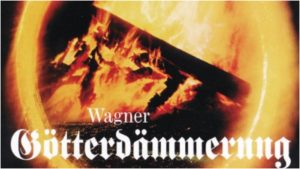
Opera Profile: Wagner’s ‘Götterdämmerung,’ The Finale of ‘Der Ring Des Nibelungen
By David Salazar“Götterdämmerung” premiered on August 17, 1876, one day after its predecessor “Siegfried” had its first performance.
The opera is the final installment in Wagner’s four-part “Der Ring Des Nibelungen,” but it was the first that the composer conceived and the first libretto of the four operas to be put to page. It was originally titled “Siegfrieds Tod,” Wagner started composition on “Götterdämmerung” while finishing Act 3 of “Siegfried.” He completed the entire score on Nov. 21, 1874, nearly 25 years after starting the Ring Cycle.
Short Plot Summary
The Norns kick off the opera talking of the past and looking to the burning of the gods in the future. After that Siegfried and Brünhilde sing of their love with the former set to go off on a journey of self-discovery.
He happens upon the Hall of the Gibichungs where he encounters Gunther, Gutrune, and their half-brother Hagen, the son of Alberich. While Alberich and Gunther plot how to get Brünhilde for Gunther, Gutrune gives Siegfried a potion that makes him forget everything and fall in love with her.
As a pact of brotherhood, Siegfried promises to help Gunther get Brünhilde.
Waltraute warns Brünhilde of the impending doom of the gods and then Siegfried, using the tarnhelm to appear as Gunther, arrives on the rock to claim Brünhilde as his own.
Hagen encounters his father in his dreams and then becomes master of ceremonies between the double weddings. Brünhilde calls Siegfried a traitor but he refuses to acknowledge knowing her. Then she plots with Gunther and Hagen to murder Siegfried.
While hunting Siegfried is struck down by Hagen and suddenly remembers Brünhilde. His body is brought back to the Gibichung hall where Brünhilde claims the Ring and announces the end of the Gods and the renewal of the world. The ring returns to the Rhine River as everything burns.
Famous Music Numbers
Conductors love “Götterdämmerung” because its music is one massive accumulation of everything that has come before it, showcased in new and unique ways.
Without a doubt, the opera’s final scene, the lengthy “Immolation” of the entire world is one of the great musical passages of all-time, led by Brünhilde and climaxing in one of the most glorious melodies ever created.
But before that we have to look to Siegfried’s death scene – from his monologue to the incredible music that follows it. And then audiences must also look out for the opening love duet, the Rhine river music and then the entirety of Act 2 with its confrontation between Hagen and Alberich, the chorus (the first of the Ring Cycle) and, finally, the dramatic showdown between Brünhilde and Siegfried and the trio that follows
Watch and Listening
In keeping with the theme we established in the “Walküre” Opera Profile, we will showcase Patrice Chéreau’s revolutionary production of the opera, which might still be the best of the 20th century.
Categories
Opera Wiki

